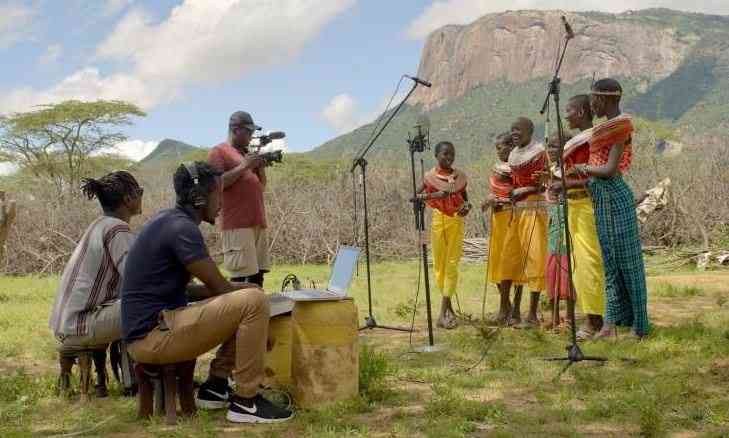
Picture this: a giant bird carries two children - a brother and a sister - on its back…back into time, to an African community in search of old, forgotten children’s songs and bring them back to life. How cool is that?
While that is happening in the magical realm, in real life, a team of young creatives travels to these destinations; and spends several days with the community, where they get to learn these songs.
The team carries recording equipment, where members of the host community sing the song using their traditional instruments. The recorded songs are then taken to a professional studio for fine-tuning.
In the meantime, a team of animators is working on a storyline to accompany the song. The result is a beautiful 2D, animated children’s musical.
While Uli and Tata are animated characters, they are real-life children belonging to two young couples; the Nyamweyas and the Akatsas, where the line between real life and fiction gets blurred and life made to imitate art.
To get this story, I had to make my way to a cabin in the woods, in the heart of Karen, the home of Pungulu Pa Productions, where the magic happens.
Here, I find Sarah Mallia, the co-founder and creative producer and her big friendly dog. Over a cup of coffee, on the cabin’s verandah, she narrates the story of how Uli and Tata came to be.
The idea of Uli and Tata Nursery Rhymes was birthed by accident in 2020. Then, the whole country was under lockdown, due to Covid-19.
Mallia and her husband Chief Nyamweya were looking for things to occupy their young son Tata. “We tried looking for African songs for children, but we were not successful,” she says.
Their friend Manu Akatsa, whose daughter Uli is friends with Tata, also found himself in a similar predicament. That is how the idea of searching for African nursery rhymes was formed and given the names of their two children.
Mallia, Nyamweya and Akatsa are co-founders of Punglu Pa Productions, the producers of Uli and Tata Nursery School Rhymes.
With initial seed funding from the Kenya Film Commission, Pungulu Pa decided to start in Kakamega, where Akatsa comes from. Here, they chose the song Nsimbidi, which is a children’s song talking about sowing seeds.
In the Pungulu Pa production, the song comes with a storyline. In this episode, Uli and Tata, live with their parents in Nairobi West at a time of drought.
“The children are looking for something to play with when they come across two traditional instruments; an Isikuti drum and orutu,” says Mallia.
“These instruments belonged to their grandparents, but have been tucked away for a long time. They begin to play with them and suddenly a huge blue bird, Tuki, appears.”
The bird, which is voiced by John Sibi-Okumu, carries the children to the Kakamega forest and teaches them about rain.
Pungulu Pa are among the recipients of the Hii Stage initiative, funded by Create Africa and administered by the Heva Fund to expand the Uli and Tata Nursery Rhymes projects to other parts of Kenya and beyond.
The Hii Stage initiative falls under the Talanta Hela program of the Kenyan government that, among other things, seeks to create employment opportunities, for the youth, in the creative sector.
“We want to play our role in documenting and archiving these songs that are otherwise at the risk of getting lost,” she says.
“We have been to nine regions in Kenya and Tanzania, researching and recording the songs from those communities,” she says.
Apart from Kakamega, the other areas they have visited include Kisumu, the North Rift, Samburu, Marsabit, Lamu, Kilifi, Eyasi Valley in the Arusha region and Makueni.
With the Create Africa funding Pungulu Pa has hired 30 professionals in the video and music production chain; editors, composers, illustrators, animators storyboard artists, among others.